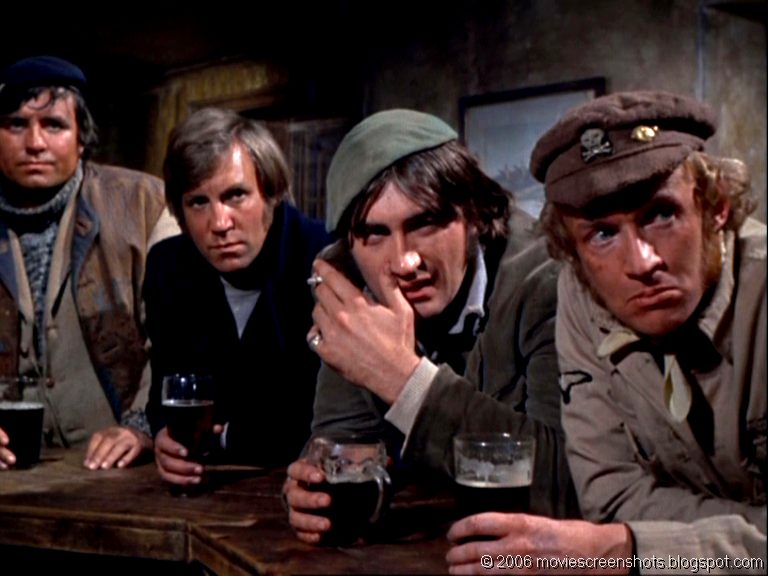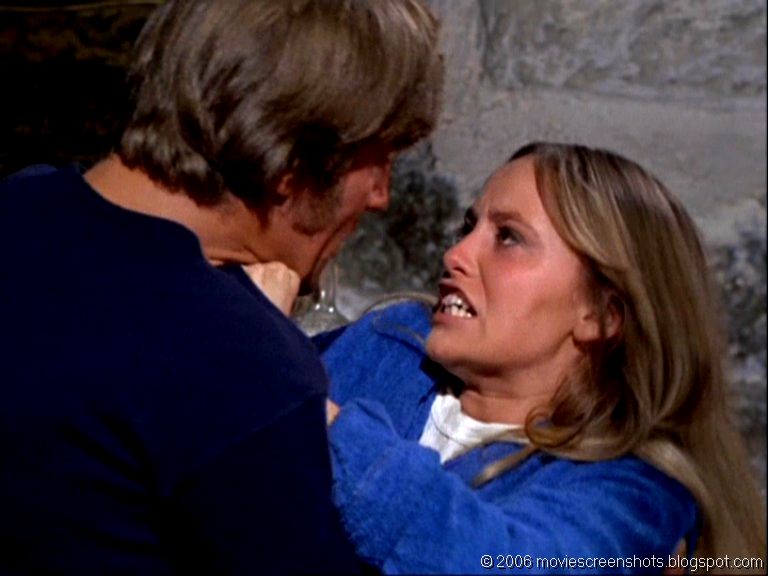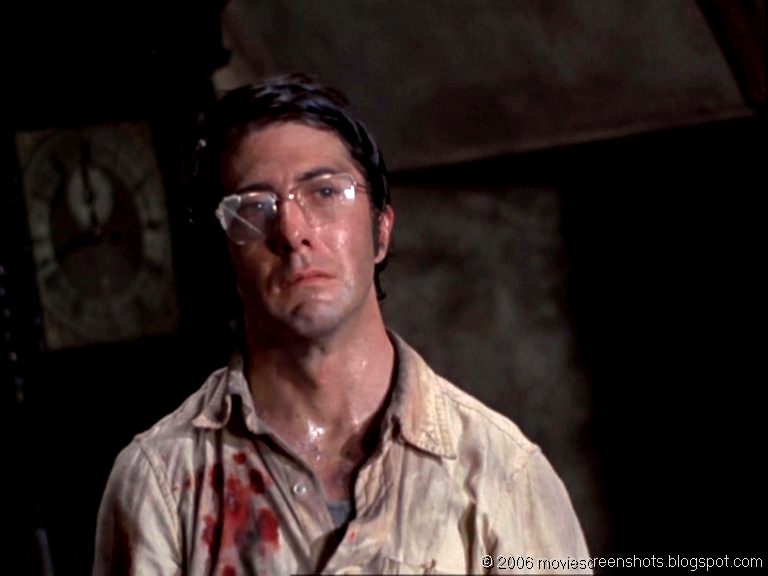
Note: This post is part of the Lovesick Blog-a-thon at 100 Films.
I had read many descriptions of Straw Dogs prior to seeing it, and all of them played it up as 'Dustin Hoffman goes mad, ruthlessly kills his enemies, Bloody Sam Peckinpah at his bloody best!' (which is admittedly an attractive plot), but none of them spoke of the complex study of marriage and love contained in it. Like many of Sam Peckinpah's films, the intriguing story was ignored by the public in favor of the bloodshed and violence contained in it. And while Straw Dogs is indeed violent and graphic, it uses these elements to convey a message of the sacrifices that must be made in a marriage and what becomes of love once that is the only thing two people have in common. Peckinpah shows that marriage can full of unrealized violence, that to co-exist for most of a lifetime, two people must sometimes treat each other like enemies.
Dustin Hoffman and Susan George (perhaps never more beautiful) are David and Amy Sumner, who are in the early stages of settling in Amy's hometown -- a decaying, ruthless rural English community. It could be interpreted that the couple left Vietnam War-embroiled America for a place where their pacifist views could be more widely accepted, but it also makes sense that Amy wanted to live in an environment where she could become the dominant figure in their marriage. David explains that they are living in the town so that he can finish some kind of grant-sponsored math study.
Right off the bat we can see inside the character of Amy -- as she is proudly walking through the streets in a thin sweater with no bra.  The town is exactly how it was when she left, complete with a population of drunk and immature men, at least one of which has a sexual history with her (and he is not shy about reminding her of that fact). It is clear that the Sumners are now on Amy's turf -- a strange place where she knows the rules of the land, and knows that she is the object of affection for every male eye.
The town is exactly how it was when she left, complete with a population of drunk and immature men, at least one of which has a sexual history with her (and he is not shy about reminding her of that fact). It is clear that the Sumners are now on Amy's turf -- a strange place where she knows the rules of the land, and knows that she is the object of affection for every male eye.
David is uncomfortable in this new place and perhaps regrets their decision to move. He soon finds out that life in the town is simply a series of tests of will between the men, and he witnesses one inside the bar -- with the lone constable seemingly rolling his eyes and the long-beaten characters (the barkeep) offering not even a thought of resistance. David is a pacifist at heart, who keeps to himself and simply wants a little peace and quiet while he slaves at his blackboard with equations. Since he is passive, David gets his way with Amy by exerting his intelligence on her and treating his wife like a child. Amy reacts like a child because her defense mechanism is her sexuality -- which is mostly useless against David who is always buried in studies. We see that though the Sumners exude an air of sophistication, their hearts have much growing to do and they live in a dysfunctional marriage.
He soon finds out that life in the town is simply a series of tests of will between the men, and he witnesses one inside the bar -- with the lone constable seemingly rolling his eyes and the long-beaten characters (the barkeep) offering not even a thought of resistance. David is a pacifist at heart, who keeps to himself and simply wants a little peace and quiet while he slaves at his blackboard with equations. Since he is passive, David gets his way with Amy by exerting his intelligence on her and treating his wife like a child. Amy reacts like a child because her defense mechanism is her sexuality -- which is mostly useless against David who is always buried in studies. We see that though the Sumners exude an air of sophistication, their hearts have much growing to do and they live in a dysfunctional marriage.
David and Amy are only able to express their passion when they let down their guard and act like children -- such as the early bedroom scene that devolves from a lesson in chess (an attempt by Amy to appeal to David's intelligence) to an under the sheets whirlwind of junior high giggling. During this scene, the Sumners are spied on through the window by a few townsfolk who see this act as novelty, since it is so different than their buttoned down way of life where emotions are seldom seen or welcomed. The Sumners' fragile relationship begins to slowly fray because of outside forces -- starting with Amy's old chums who are now employed to finish a roof on their garage. They eagerly watch as Amy gets out of her car in a dress, and accidentally flashes her panties. Amy is clearly disturbed by this event and their reactions, but it is also a discovery of where she can find the emotions so clearly lacking at home. She takes this a step further by walking near a window topless, explicitly letting them see her body. While Amy delights in the attention being paid her body, she is also unknowingly opening a door to the violent sexual hunger of the men, who see her act as an invitation.
The Sumners' fragile relationship begins to slowly fray because of outside forces -- starting with Amy's old chums who are now employed to finish a roof on their garage. They eagerly watch as Amy gets out of her car in a dress, and accidentally flashes her panties. Amy is clearly disturbed by this event and their reactions, but it is also a discovery of where she can find the emotions so clearly lacking at home. She takes this a step further by walking near a window topless, explicitly letting them see her body. While Amy delights in the attention being paid her body, she is also unknowingly opening a door to the violent sexual hunger of the men, who see her act as an invitation.
As Amy is unwisely stoking the men's libido, David is being slowly ground down by the goons -- who use his pacifist tactics against him -- demonstrating that they can get into his house by stealing Amy's panties and leaving their dead cat hanging in the closet. The men trap David into one of the town's violent rituals of testing his tolerance, setting a precedent by seeing how far they can go before he snaps. A similar act is happening in the Sumners' home, as Amy is basically daring David to do something about the dead cat -- knowing full well that he is incapable of any retaliation. By calling her husband's non-shot, Amy has gained the upper hand in their marriage that she so desired. In her native land, she has the advantage over David, and is damn well going to use it. David tries to win over his wife by agreeing to go hunting with the men, but in doing so only enables the final part of their plan: leaving Amy home alone. Amy's old flame Charlie sneaks away from the hunting group and tries to make like old times inside her house. Amy resists his advances, but is powerless against his brute strength and is conflicted because she probably realizes how in this environment it is actually her fault because she was asking for it by exposing herself to Charlie and his friends. Equally conflicting to Amy is that she is finally receiving the lust and physical passion she has been begging for since she and David moved to England. For a moment we see Amy semi-enjoy Charlie having his way with her, and then it is gone as she tries to process the emotions and feelings she is experiencing.
David tries to win over his wife by agreeing to go hunting with the men, but in doing so only enables the final part of their plan: leaving Amy home alone. Amy's old flame Charlie sneaks away from the hunting group and tries to make like old times inside her house. Amy resists his advances, but is powerless against his brute strength and is conflicted because she probably realizes how in this environment it is actually her fault because she was asking for it by exposing herself to Charlie and his friends. Equally conflicting to Amy is that she is finally receiving the lust and physical passion she has been begging for since she and David moved to England. For a moment we see Amy semi-enjoy Charlie having his way with her, and then it is gone as she tries to process the emotions and feelings she is experiencing.
The American in Amy wants to tell David about the rape, but her upbringing tells her to forget it -- since it was partially her fault. Meanwhile, shooting a shotgun during the hunt seems to have energized David, who fires Charlie's men for abandoning him on the hunt. Things come to a boil when David tries to harbor the village black sheep Henry (David Warner), who accidentally suffocated the young granddaughter of the town's drunken patriarch. The young girl probably mirrors Amy of years ago, as she struts around in skimpy clothing through the streets of an environment not made for her. After trying to find attention from the town's men, she goes after Henry -- who is mildly retarded and serving a lifetime of penance for a previous advance on a young girl. David knows the mob will kill Henry, and keeps him safe while plotting a plan to exact his revenge on all of them -- and in effect his wife, by showing her what he is capable of. During this process, David and Amy enjoy a fleeting moment of shared passion as Amy begins to see her husband as the kind of man her town produces, and is obviously turned on by it. In the end, David's pacifist ways come to an end, but so does his marriage, as in 'winning' the war within he and Amy's relationship -- he has only found the door to escape.
David knows the mob will kill Henry, and keeps him safe while plotting a plan to exact his revenge on all of them -- and in effect his wife, by showing her what he is capable of. During this process, David and Amy enjoy a fleeting moment of shared passion as Amy begins to see her husband as the kind of man her town produces, and is obviously turned on by it. In the end, David's pacifist ways come to an end, but so does his marriage, as in 'winning' the war within he and Amy's relationship -- he has only found the door to escape.
Thanks to Movie Screenshot blog for the excellent screenshots.
Tuesday, February 13, 2007
Peckinpah's Valentine
Filed Under Blog-a-thon, Classic reviews, Essays, Sam Peckinpah
Subscribe to:
Post Comments (Atom)












10 comments:
An excellent post about a movie that's too often mischaracterized on many levels. Though, if I had to pick a Peckinpah for the lovesick blog-a-thon, I'd be twisted and go with Bring Me the Head of Alfredo Garcia, a love story between a man and his friend's severed head.
Nicely done. I myself am guilty of thinking of that movie as bloody revenge. You have given me a new way to view it again.
Thoughtful piece. I haven't seen this yet but I'll keep your perspective about the struggle for power within a marriage in mind when I do watch it.
I liked Bring Me the Head of Alfredo Garcia, but it took a lot out of me to watch it. I just felt drained and exhausted.
Perhaps I'l make some coffee sometime for this.
Johanna -- I had the exact same problem with Alfredo Garcia! It takes a lot of energy to get through it, probably due to the overwhelming bleakness of it all.
Adam
nice to know it wasn't just me
[half-ass-grin smiley here]
I'd agree with Alfredo Garcia, but also for the presence of the beautiful Isela Vega (lice or no lice).
The most obviously romantic Peckinpah, tho, would be Ballad of Cable Hogue.
I'd never think of Straw Dogs, tho. Interesting.
Here's a radically different interpretation of the film
Thanks for the link Noel -- that's a spectacular read! I will have to revisit Straw Dogs again after reading Dana's deep analysis.
Make no mistake, I found no romance in Straw Dogs -- it was the unique portayal of marriage that led me to include it in Lucas' blog-a-thon.
And I'm with you in regards to Alfredo Garcia -- I love Vega's character, her "I've been here before line" always gives me chills.
Oh, I didn't mean to imply hers is the more valid (it's longer and more complex, sure); I'm just fascinated by the fact that the film inspired both your reactions.
St valentine's day is the best holiday!
Post a Comment